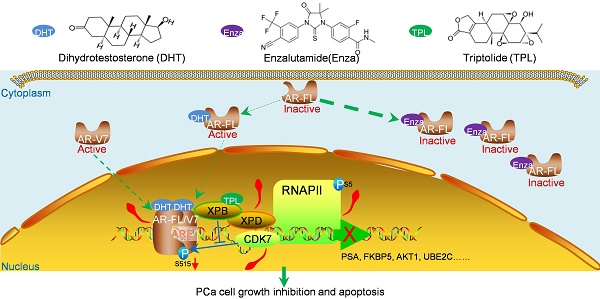当前位置:
X-MOL 学术
›
Theranostics
›
论文详情
Our official English website, www.x-mol.net, welcomes your feedback! (Note: you will need to create a separate account there.)
Therapeutic Inhibition of miR-4260 Suppresses Colorectal Cancer via Targeting MCC and SMAD4
Theranostics ( IF 12.4 ) Pub Date : 2017-04-10 , DOI: 10.7150/thno.19168 Junjie Xiao , Dongchao Lv , Jinzhe Zhou , Yihua Bei , Ting Chen , Muren Hu , Qiulian Zhou , Siyi Fu , Qi Huang
Theranostics ( IF 12.4 ) Pub Date : 2017-04-10 , DOI: 10.7150/thno.19168 Junjie Xiao , Dongchao Lv , Jinzhe Zhou , Yihua Bei , Ting Chen , Muren Hu , Qiulian Zhou , Siyi Fu , Qi Huang

|
Dysregulation of microRNAs (miRNAs, miRs) and their putative target genes have been increasingly reported to contribute to colorectal cancer. However, miRNAs that directly target the mutated in colorectal cancer (MCC) gene, a tumor suppressor which is downregulated or inactivated in colorectal cancer, remain largely unknown. By using an array-based miRNA analysis, we identified a group of miRNAs that were dysregulated in human metastatic versus non-metastatic colorectal cancer tissues. One of these miRNAs, miR-4260, was predicted to target MCC in the miRDB database. Results using human HCT116 and HT29 colorectal cancer cell lines showed that miR-4260 mimic enhanced cell proliferation and migration and reduced apoptosis induced by the chemotherapeutic agent 5-fluorouracil while miR-4260 inhibitor had inverse effects. Furthermore, miR-4260 negatively regulated MCC as well as SMAD4 by directly binding to the 3'untranslational region (3'UTR). Using siRNAs targeting MCC or SMAD4, we showed that upregulation of MCC and SMAD4 was essential to mediate the functional roles of miR-4260 inhibitor in colorectal cancer cells. Our in vivo experiments indicated that inhibition of miR-4260 reduced colorectal tumor growth in nude mice subcutaneously implanted with HCT116 cells. Significantly, miR-4260 was increased in human colorectal cancer tissues with simultaneous downregulation of MCC and SMAD4, strongly suggesting the clinical relevance of targeting miR-4260 in the treatment of colorectal cancer. In summary, we identified miR-4260 as a novel oncomiR for colorectal cancer that targets MCC and SMAD4. Inhibition of miR-4260 can, therefore, be a potential therapeutic strategy for colorectal cancer.
中文翻译:

miR-4260的治疗抑制通过靶向MCC和SMAD4抑制大肠癌
越来越多地报道了microRNA(miRNA,miRs)及其假定的靶基因的失调导致大肠癌。然而,直接靶向大肠癌(MCC)基因突变的miRNA(在大肠癌中被下调或失活的肿瘤抑制因子)仍然未知。通过使用基于阵列的miRNA的分析,我们确定了在人类转移性被失调的一组miRNA的对非转移性结直肠癌组织。这些miRNA之一miR-4260预计会靶向miRDB数据库中的MCC。使用人类HCT116和HT29大肠癌细胞系的结果显示,miR-4260模仿了化学治疗剂5-氟尿嘧啶诱导的细胞增殖和迁移并减少了细胞凋亡,而miR-4260抑制剂则具有相反的作用。此外,miR-4260通过直接结合3'非翻译区(3'UTR)来负调控MCC和SMAD4。使用针对MCC或SMAD4的siRNA,我们表明MCC和SMAD4的上调对于介导miR-4260抑制剂在结直肠癌细胞中的功能至关重要。我们的体内实验表明,对miR-4260的抑制作用可降低皮下植入HCT116细胞的裸鼠的结直肠肿瘤生长。值得注意的是,miR-4260在人大肠癌组织中增加,同时MCC和SMAD4下调,强烈提示靶向miR-4260在大肠癌治疗中的临床意义。总之,我们将miR-4260确定为针对MCC和SMAD4的结直肠癌的新型OncomiR。因此,抑制miR-4260可能是结直肠癌的潜在治疗策略。
更新日期:2017-07-01
中文翻译:

miR-4260的治疗抑制通过靶向MCC和SMAD4抑制大肠癌
越来越多地报道了microRNA(miRNA,miRs)及其假定的靶基因的失调导致大肠癌。然而,直接靶向大肠癌(MCC)基因突变的miRNA(在大肠癌中被下调或失活的肿瘤抑制因子)仍然未知。通过使用基于阵列的miRNA的分析,我们确定了在人类转移性被失调的一组miRNA的对非转移性结直肠癌组织。这些miRNA之一miR-4260预计会靶向miRDB数据库中的MCC。使用人类HCT116和HT29大肠癌细胞系的结果显示,miR-4260模仿了化学治疗剂5-氟尿嘧啶诱导的细胞增殖和迁移并减少了细胞凋亡,而miR-4260抑制剂则具有相反的作用。此外,miR-4260通过直接结合3'非翻译区(3'UTR)来负调控MCC和SMAD4。使用针对MCC或SMAD4的siRNA,我们表明MCC和SMAD4的上调对于介导miR-4260抑制剂在结直肠癌细胞中的功能至关重要。我们的体内实验表明,对miR-4260的抑制作用可降低皮下植入HCT116细胞的裸鼠的结直肠肿瘤生长。值得注意的是,miR-4260在人大肠癌组织中增加,同时MCC和SMAD4下调,强烈提示靶向miR-4260在大肠癌治疗中的临床意义。总之,我们将miR-4260确定为针对MCC和SMAD4的结直肠癌的新型OncomiR。因此,抑制miR-4260可能是结直肠癌的潜在治疗策略。



























 京公网安备 11010802027423号
京公网安备 11010802027423号